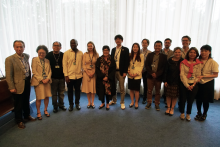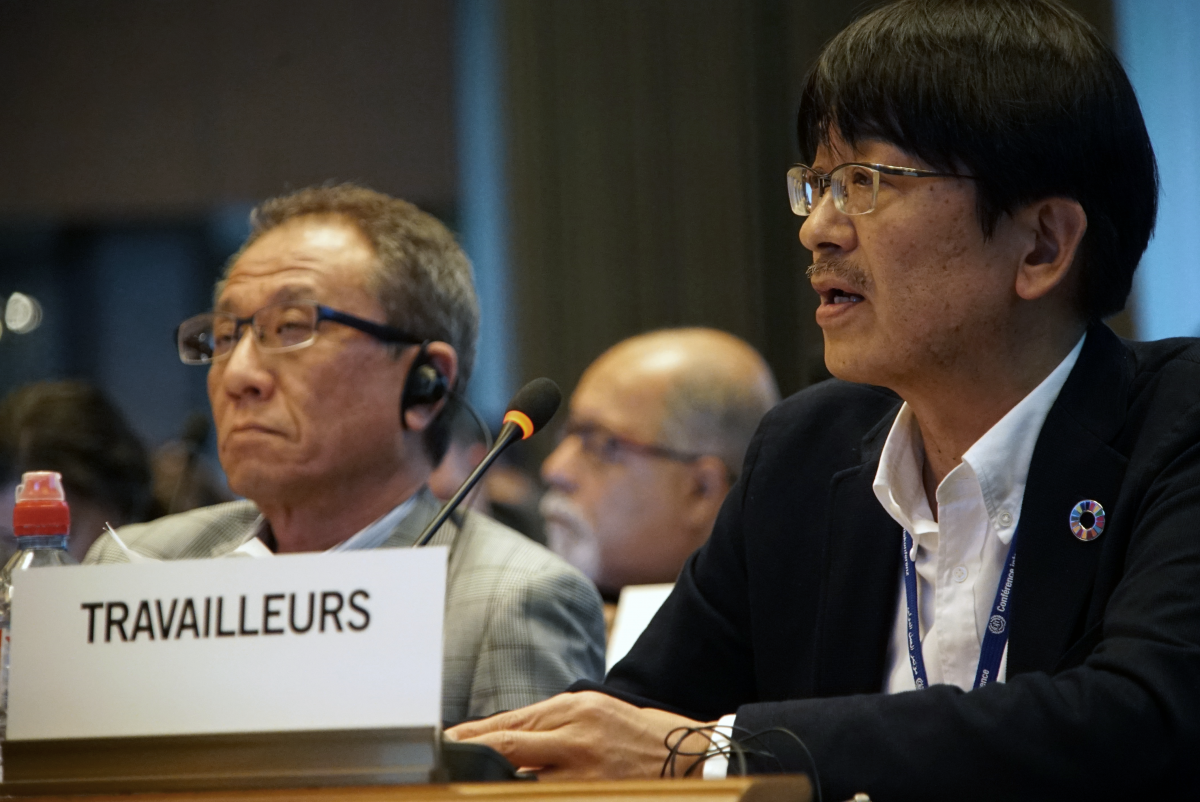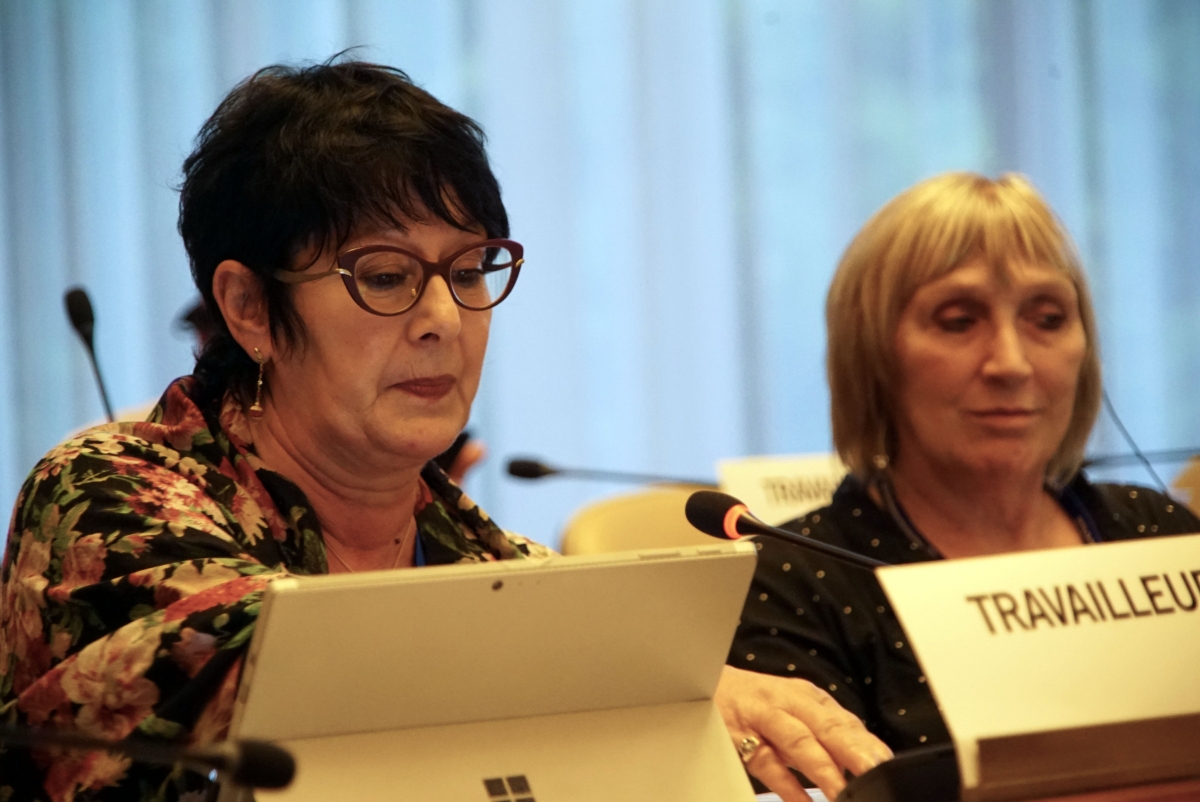PSI and Jichiro speak at Japan CAS hearing @ ILC 2018

This is an issue which PSI and our Japanese affiliates have been consistently pushing to the fore. Last week, PSI discussed the case in depth with Jichiro President Atsushi Kawamoto.
On June 4th, both President Kawamoto and PSI General Secretary Rosa Pavanelli took to the floor of the Committee to highlight the urgent need for the Japanese Government to adhere to ILO conventions and recognize the right to organise for all public service wokers.
See their speeches below:

JICHIRO President, Atsushi KAWAMOTO:
I wish to thank the Chairperson for giving me this opportunity to speak. First, our country has continued to violate ILO Conventions Nos. 87 and 98 regarding basic labour rights for public service employees for 70 years since the National Public Service Act was revised in 1948. These days strong concerns and apprehensions are being expressed that the current system may be perpetuated into the future.
Violations of Japan’s public service employees’ freedom of association have been severe, extensive and diverse. They include among other things an employee organization registration system, that denies a guarantee of autonomous activities and the principle of self-determination for unions and disavows the right to form organizations without prior approval; a full-time union officer system that violates freedom to appoint officers, an important part of the right to organize, by leaving it to the discretion of appointive authorities; having the scope of managerial staff determined by a third-party organization not calling for consensus or the views of employee organizations regarding unilateral applications for approval from the employer; and prohibition of the right to organize by laws governing fire-fighting personnel and staff members at penal institutions.
It is well known that improvements have been sought from the Government of Japan regarding these issues through repeated indications in the many reports and recommendations by the Committee on Freedom of Association and also in the reports by the Committee of Experts on the Application of Conventions and Recommendations since 1965, when the Committee on Freedom of Association dispatched the Dreyer Commission to our country as its first fact-finding and conciliation commission, and made its recommendations based on that.
Also, this committee has engaged in many discussions, but it strongly draws attention to the fact that the issues it has repeatedly indicated to the Government of Japan remain unresolved. On the other hand, the government submitted legal system reform bills in the meantime to the National Diet. These had been proposed in connection with national public employees in June 2011 and in connection with local public employees in November 2012, including provision of the right to organize to fire-fighting personnel. These bills had important significance toward resolving these issues as a historical first step, opening the possibility of restoring basic labour rights based on faithful and thorough consultations among the government, JTUC-RENGO and the unions involved at that time.
Due to the dissolution of the House of Representatives in November 2012, however, both bills were discarded with deliberations never completed. I call for attention of the committee on this occasion that the observation from the Committee of Experts on the Application of Conventions and Recommendations expressed “regrets” regarding the discarding of the bills. Subsequently, the administration changed hands after the general election in December 2012, and in the revisions to the legal system made during the ordinary Diet session of 2014 under the current administration, no measures whatsoever were taken concerning issues that had been pointed out to the Government of Japan repeatedly for improvement.
I point out that the Government of Japan has not conducted any serious consideration toward their resolution since then. Now, seven years have passed since the Great East Japan Earthquake of March 11, 2011. Once again, we wish to express our heartfelt gratitude for the support we have received since then from international society. However, while the number of evacuees from the disaster has decreased from the original approximately 470,000, as of March 2018, more than 70,000 of them continue living as evacuees. Reconstruction and revival are still underway, and the citizens and residents of the affected areas have extremely high expectations of the public service employees who are playing a leading role in that.
Moreover, I emphasize that the guarantee of the right to organize trade unions that our country’s public service employees have been hoping for has not been forthcoming, though they battle day and night to fulfil their duties for reconstruction and revival. For example, the primary factor that enabled the fire-fighters to cool down Fukushima’s nuclear reactors by spraying them with water, performing work they had no previous experience with and lacking sufficient information, was above all their strong sense of mission towards their work to “protect the lives and property of the citizens.”
On the other hand, the assertion by the government and other parties involved in denying fire-fighting personnel the right to organize thus far appears entirely to have been that providing them the right to organize would badly influence them in their duties. This, however, is simply changing the argument. From start to finish, performance of duties and ensuring the right to organize are two completely different matters. What’s more, it is completely unthinkable that having the right to organize would have an effect on the performance of duties by our country’s fire-fighters, whose strong sense of mission has been highlighted in their recovery work after the Great East Japan Earthquake. Since 1965, when our country ratified Convention No. 87, more than half a century has already passed. Regarding the right for fire-fighting personnel to organize, which has continued to be denied since then, we call strongly for immediate resolution of the current situation in which the organization of unions, which constitutes the basis of freedom of association, is denied irrationally and unjustly by law.
Next, I will relate an example in which trade union rights were retracted, followed by freedom of association, for some occupational categories, because resolution of the issue of basic labour rights for all public service employees did not materialize after the last individual case examination was conducted by the committee in 2008. That was in 2012, when changes in public finance were proposed for national forest management—shifting from a special account to a general account—regarding treatment of basic labour rights for the workers involved, who had had the right to conclude collective bargaining agreements (CBAs). At that time, when the bills I mentioned earlier to provide the right to conclude CBAs to other national public employees were submitted to the Diet, it was assumed that the labour relations of national forestry workers, who are national public employees, would not be changed at all by the provision of the right to conclude CBAs to all national public employees.
However, even though there were no changes in the content of their work and absolutely no inevitability of changes in the labour relations of the workers involved resulting by necessity, use of a general account for public finance was adopted, and provision of the right for all national public employees to conclude CBAs was not fulfilled. For that reason, although the national forestry workers faced the serious situation of exclusion from application of the right to conclude CBAs, I note that the government has not yet taken steps to annul this retrogression and infringement of rights that cannot be overlooked.
Next, regarding the “consultation with the social partners concerned in search of the most appropriate mechanisms” that calls for “every effort” from the Government of Japan, as indicated in the observation from the Committee of Experts on the Application of Conventions and Recommendations, I report on the omissions, perfunctory response and insincere attitude on the part of the government in its consultations with the unions involved in establishing the autonomous labour-employer relations system of Article 12 of the Basic Act on Reform of the National Civil Servant System.
After the Government of Japan’s stance that it would “continue to consider the matter carefully” had become clear in 2014 during deliberations under the current administration on the National Civil Service Act, which had been set up without taking any steps to address basic labour rights issues, for three straight years, the Minister in charge repeated the same reply word-for-word that “Regarding an autonomous labour-employer relations system, wide-ranging problems exist, so while exchanging views with everyone involved, we would like to consider it carefully,” and only when the unions involved demanded it.
Note that recently the Government of Japan has made absolutely no effort to actualize any tangible investigations or exchanges of views toward resolving this issue. Regarding this point, in July of last year in its observations on the Government of Japan’s annual report, JTUC-RENGO indicated that it was an unforgivable development that could not be left as it was any further, as it was evidence of the government’s insincerity toward the Committee of Experts on the Application of Conventions and Recommendations’ reports.
Nevertheless, later on, in March of this year, the Minister in charge said, “Regarding an autonomous labour-employer relations system, wide-ranging problems exist, so while exchanging views with everyone involved, we would like to consider it carefully” in response to the unions involved, showing no change of opinion whatsoever from before. This simply makes it clear that the Government of Japan has no intention whatsoever to attempt to resolve the various issues that the Committee of Experts on the Application of Conventions and Recommendations and Committee on Freedom of Association have pointed out time and time again over these many years, and that repeating on an ad hoc basis that it would conduct “exchanges of views and investigations with the parties involved” has been a temporary stopgap measure all along.
I think that leaving this kind of stance and response by the Government of Japan as it is would be absolutely unforgivable. In conclusion, from the viewpoint of the Government of Japan’s responsibilities and obligations to international society and the ILO, in the current examination, I ask that this committee’s discussions and conclusions lead to a sincere response from the Government toward a basic, fundamental resolution of the issue of basic labour rights for the public service employees of our country. Also, JTUC-RENGO will sincerely renew its understanding ILO’s Constitution which says, “The failure of any nation to adopt humane conditions of labour is an obstacle in the way of other nations which desire to improve the conditions in their own countries,” and clarify its readiness to make every effort into taking all measures needed until the issue of basic labour rights for the public service employees of our country is resolved. Thank you very much.

Rosa Pavanelli, PSI General Secretary:
Thank you chair.
The case of Japan’s obligations under ILO Convention 87 referred to the firefighters’ right to organize has been discussed at length by the Committee on Freedom of Association (Case No. 60, 1954), the Committee of Experts (1973) and this Committee (1973) since 1954 without the Government taking concrete steps to make progress towards the full application of the Convention.
To address the issue, only in 1996, the Government established the Fire Defence Personnel Committee System with the purposes of achieving mutual understanding by eliciting opinions from the firefighters to contribute to smooth administration of their clerical matters and raise the morale of the personnel.
The Government always emphasizes the smooth operation of this system and its success to improve (1) wages, working conditions, (2) clothing, and (3) equipment and other facilities, to justify the rationality of not conferring the right to organize to fire-fighters.
However, the recognition of firefighters’ right to organize and attempts to improve current working conditions and the workplace environment are completely different matters at wholly different levels.
The Committee of Experts on the Application of Conventions and Recommendations and Committee on Freedom of Association have elucidated the minimum measures that must be provided, stating that when the right to engage in labour disputes is restricted, the existence of compensatory measures is a necessary condition.
Obviously, these cannot apply to the right to organize, as compensatory measures would assume the denial of the right itself. In other words, the Fire Defence Personnel Committee is useless as a compensatory mechanism when it denies the right to organize.
Although, the Committee of Experts on the Application of Conventions and Recommendations and Committee on Freedom of Association have provided some positive assessments of the operational status and effects of the Fire Defence Personnel Committee, they continue to call on the Government of Japan to provide fire-fighters the right to organize and to collective bargaining, obligations deriving from the ratification of ILO Conventions 87 and 98.
The tripartite expert meeting, held in April 2018, confirmed the relevance of these obligations adopting the ILO Guidelines on decent work in public emergency services, which include firefighters and reaffirm that “the unique and essential role of PES workers should not be used as a justification to deny their participation in effective social dialogue mechanisms” (para. 99), and that “[s]ocial dialogue regarding PES should be based on freedom of association, should be concluded in good faith and, where applicable under relevant ILO Conventions, should include the effective recognition of the right to collective bargaining…” (para. 100), and “[i]f deprived of the right to strike by national laws, such workers should have access to adequate, impartial and speedy conciliation and arbitration proceedings in interest disputes” (para. 105).
Therefore, we ask the Committee to carefully consider this situation in adopting the conclusions for this case.

